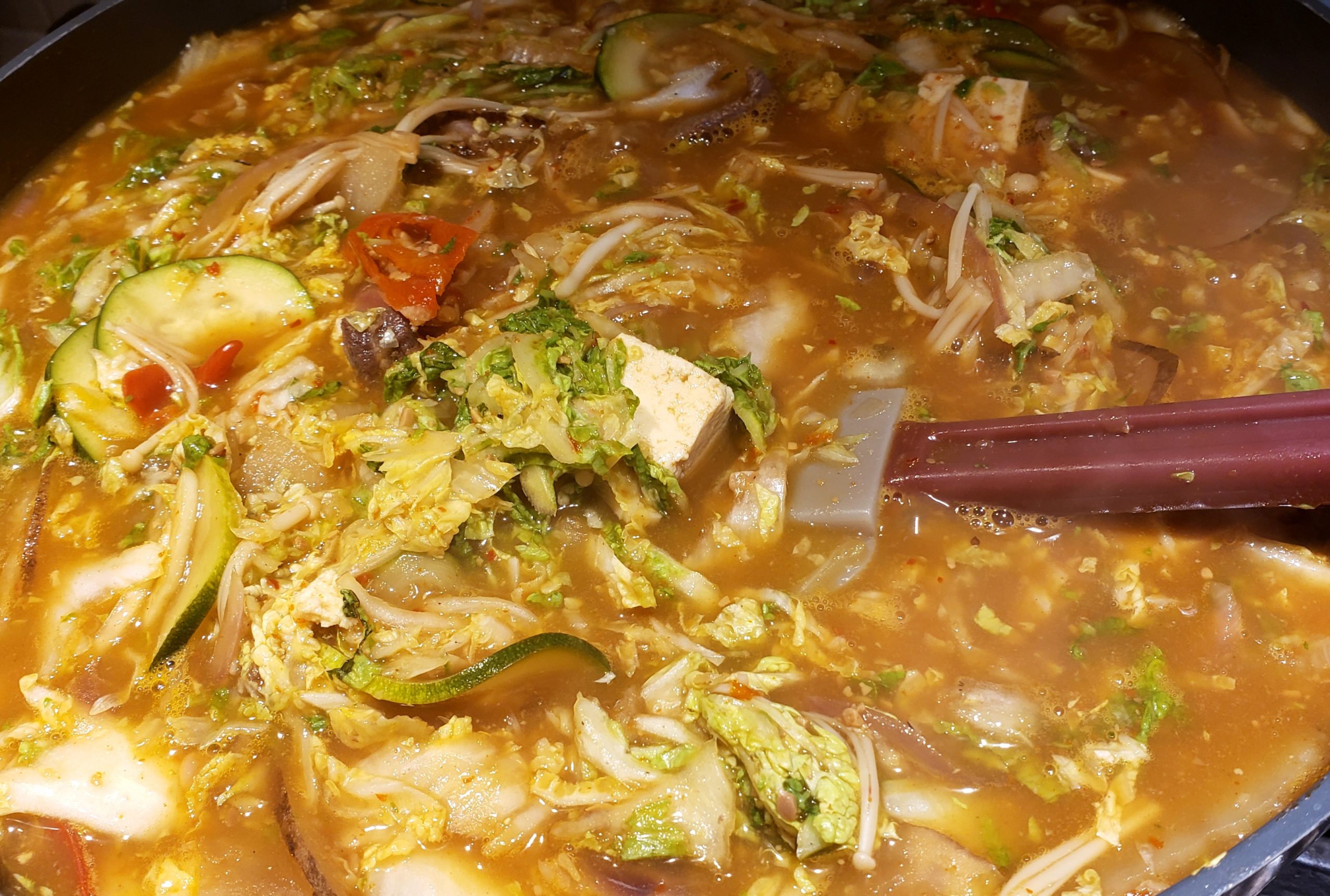Doenjang Jigae (and a WFPB approach)

This link leads you to a delightful recipe on a really cool food blogging site for Korean cuisine!
https://mykoreankitchen.com/doenjang-jjigae/
Of course I had to add a few changes to my version:
As a substitute for having to wash a lot of rice that I didn’t need for the recipe — I added enough finely powdered rice flour to the water until it seemed to match the cloudiness of typical washed rice water. I believe it is the starch in the rinse water you are looking for anyway, so this seemed to work nicely and might be an option for the person worried about what else is in the rinse water from your rice.
Also, I added an entire Napa cabbage, finely sliced to a 12 serving size recipe which provided more texture for those that enjoy less broth and more substance. To finish it out to taste, I added concentrated beef stock until the saltiness level was in balance and it helped improve the mouth feel of the broth. It may not be traditional, but worked out well for my preferences…
After discussing with my son Joey, this recipe could be easily converted to a WFPB friendly approach by substituting vegetable stock for the water in the rice water. Then, replace the beef itself with either extra tofu blocks or better yet small vegan meatballs (or chickpeas in a pinch). At the end, it could be finished to taste by adding extra doenjang paste or veggie stock concentrate until the salt level comes into balance to your preference. If you were shooting for a less spicy version, keep the gochugaru (powder) in the main soup and omit adding the extra chilis and gochurang (paste) until serving table side. Another nice addition would be fresh mung bean sprouts, which would complement (or be a decent substitute for) the textural component of the enoki mushroom.
Here is my proposed WFPB friendly version:
DOENJANG JJIGAE (WFPB Friendly)
Ingredients
- 1 lb small vegan meatballs browned in a pan covered with oil
- 1/3 cup rice wine or mirin
- A few cracks ground black pepper
- 3 quarts vegetable broth with ½ cup fine rice flour added
- 2/3 cup doenjang (Korean soybean paste)
- 1/8 cup ssamjang (Korean spicy dipping sauce – omit for less spicy)
- 1/8 cup gochugaru (Korean chili flakes)
- 1 tbsp minced garlic
- 1 tbsp minced ginger
- 2 medium large russet potatoes (about 1/2 lb), thinly sliced
- 1 medium large zucchini (about 1/2 lb), thinly sliced
- 1 medium large onion (about 1/4 lb), thinly sliced
- 1 small package enoki mushrooms (about 1/4 lb), stems removed
- 1/2 lb mung bean sprouts
- 4 oz shiitake mushrooms, thinly sliced
- 1 regular package tofu, sliced into medium rectangle pieces
- 1-2 green onions (about 2 ounces), thinly sliced
- 1 large head Napa cabbage (5-6 lbs), quartered and cored, thinly sliced
- 6-9 chilies (omit for less spicy), green and/or red, thinly sliced
Instructions
- Preheat a large stockpot briefly over medium high heat with the bottom completely covered with olive or vegetable oil. Add the meatballs and stir lightly rolling around to brown on all sides. Add the rice wine or mirin, pepper and potatoes and stir for about 2 mins.
- Add the vegetable broth with rice flour, doenjang (Korean soybean paste) and ssamjang (Korean spicy dipping sauce) already dissolved before adding to heat (can use stick blender with a portion of the broth to help dissolve). Add gochugaru (Korean chili flakes), ginger and garlic. Stir around.
- Once the water starts rolling boiling, add the zucchini and onions. Boil for 1 min. Add the mushrooms, bean sprouts and tofu then boil for 1 min. Add green onions, Napa cabbage and chilies and boil a further 1 min. Remove from the heat.
- Add extra doenjang, soy sauce, fish sauce and/or veggie stock concentrate to taste (for saltiness, mouth feel, umami and earthiness).
